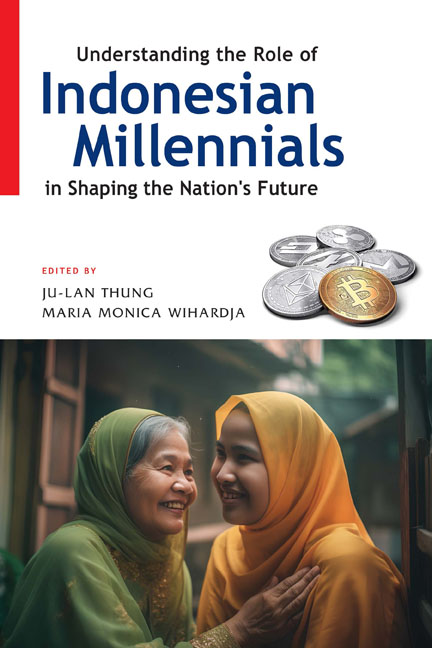Book contents
- Frontmatter
- Contents
- List of Figures
- List of Tables
- List of Annexes and Appendixes
- About the Contributors
- Introduction: Understanding the Role of Indonesian Millennials in Shaping a Nation’s Future
- 1 Generational Differences in Life Course Trajectories of Indonesians in Their Mid-twenties: Comparing Millennials and Older Cohorts
- 2 Millennials and Politics in Indonesia: 2019 and Beyond
- 3 Progressive Yet Powerless: The State of Indonesia’s Progressive Youth Organizations in the Post-Authoritarian Era
- 4 Indonesia’s Millennials and Gen Zs: Are They Financially (Il)literate?
- 5 Digital Competencies of the Millennial Generation in Micro, Small, and Medium Enterprises in West Bandung District
- 6 Millennial Muslims and “Haram Fatwas” on Cryptocurrency in Contemporary Indonesia
- 7 Youth and Religious Disaffiliation: A Study of Indonesian Millennials Learning Buddhism during Spiritual Disruption
- 8 Antagonism and Afterwards: Millennials in Indonesian Participatory Art after Reformasi
- 9 The NFT Phenomenon among Indonesia’s Millennial Artists
- Index
3 - Progressive Yet Powerless: The State of Indonesia’s Progressive Youth Organizations in the Post-Authoritarian Era
Published online by Cambridge University Press: 13 April 2024
- Frontmatter
- Contents
- List of Figures
- List of Tables
- List of Annexes and Appendixes
- About the Contributors
- Introduction: Understanding the Role of Indonesian Millennials in Shaping a Nation’s Future
- 1 Generational Differences in Life Course Trajectories of Indonesians in Their Mid-twenties: Comparing Millennials and Older Cohorts
- 2 Millennials and Politics in Indonesia: 2019 and Beyond
- 3 Progressive Yet Powerless: The State of Indonesia’s Progressive Youth Organizations in the Post-Authoritarian Era
- 4 Indonesia’s Millennials and Gen Zs: Are They Financially (Il)literate?
- 5 Digital Competencies of the Millennial Generation in Micro, Small, and Medium Enterprises in West Bandung District
- 6 Millennial Muslims and “Haram Fatwas” on Cryptocurrency in Contemporary Indonesia
- 7 Youth and Religious Disaffiliation: A Study of Indonesian Millennials Learning Buddhism during Spiritual Disruption
- 8 Antagonism and Afterwards: Millennials in Indonesian Participatory Art after Reformasi
- 9 The NFT Phenomenon among Indonesia’s Millennial Artists
- Index
Summary
The contemporary youth-led movements and protests in the Global North and South have rekindled the popular image of youths as agents of change. Indonesia is no exception, as Indonesian millennials have taken the initiative to push progressive agendas, especially after the fall of the authoritarian regime in 1998. This development has been tracked meticulously by various scholars whose works have raised hopes that the involvement of Indonesian millennials in politics will have positive impacts. Contrary to their views, however, we argue that Indonesian millennials need a stronger organizational foundation to play the role of driver of progressive agendas. Based on an online survey involving 206 progressive youth organizations in Indonesia and 82 semi-structured interviews, we found that although some of these organizations have managed to establish basic organizational mechanisms (statutes, annual plans, evaluation mechanisms), they are still not well connected to potential social bases, especially in university campuses and in provinces other than those where they are based. The absence of a broad social base potentially undermines their social justice agendas since an agenda without strong social support comes across to political elites and policymakers as mere empty bluster. We contend that our study contributes to conversations on the role of Indonesian youth in politics and the Indonesian youth social movement in the post-authoritarian era.
INDONESIAN YOUTHS AS AGENTS OF CHANGE
History often portrays youths as agents of change. Such an image stems from their involvement in critical moments such as large-scale protests, regime changes or revolutions. As youths have been at the centre stage of these moments throughout historical periods, every generation tends to produce its own narratives of how heroic youths spark social change.
The millennial generation is not an exception. Born between the early 1980s and late 1990s, the millennial generation witnessed pivotal social disruptions in which they carried on the struggle for gender equality, civil liberty, environmental justice and racial justice, reproducing the popular narrative of youths as agents of change. As they grow into adolescence and consume information through multiple social media platforms, they realize that when their freedom and basic rights are undermined, they must take up the baton for transforming their society. Combined with wanting to redress society's economic grievances, millennials seek transformations of the existing political and social order that they find repressive and impeding their hopes for a better future.
- Type
- Chapter
- Information
- Publisher: ISEAS–Yusof Ishak InstitutePrint publication year: 2024

